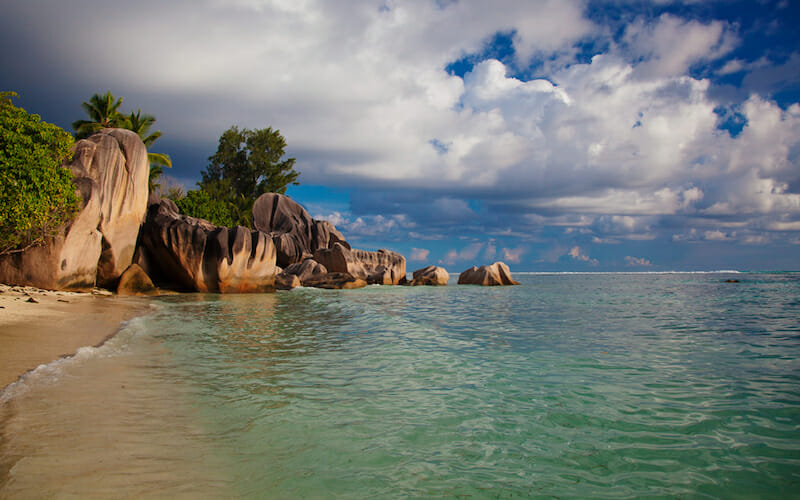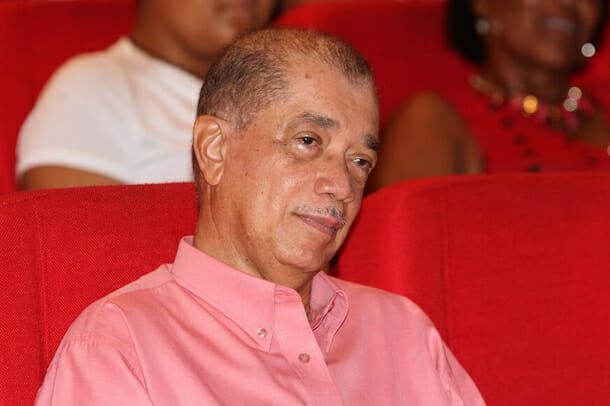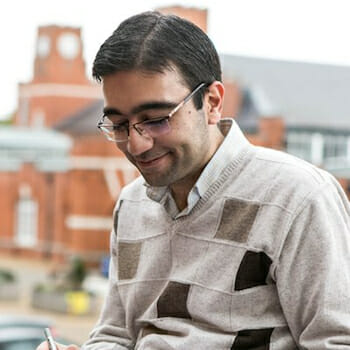
‘We will have to try and win new markets’: James Michel, former President of Seychelles
Seychelles is an archipelago country in the Indian Ocean and a member of the Commonwealth of Nations. With a population of less than 100,000, it’s the 14th smallest country in the world. Seychelles, however, has a thriving economy and is attracting international investment and receiving numerous tourists who want to visit its wonders.
Seychelles won independence from the United Kingdom on 29th June 1976 and is a member of the African Union. Its vibrant economy developed from a mostly agricultural society to a market-based diversified economy but there are still problems such as unequal wealth distribution. An article in The Telegraph once described Seychelles as the “most beautiful islands on Earth” and those who’ve visited the country can testify that the British newspaper doesn’t get it wrong.
Some of us know Seychelles by its heavenly islands and some of us by its famous names: The FIFA international football referee Eddy Maillet, singers and performers Sandra Esparon and Angie Arnephy and the late writer and poet Antoine Abel.
I had the opportunity to interview James Michel, the former president of Seychelles, and ask him about the nation’s economic achievements, foreign relations, its fight against climate change and its flourishing tourism industry.
James Alix Michel is a distinguished Seychellois politician who was president of Seychelles from 2004 to 2016. He previously served as the Vice-President and is a member of the People’s Party. He spearheaded the country’s efforts to tackle inflation and economic stagnation and is credited with many major reforms.
Our conversation, conducted via email and edited only for content, follows.
Dear Mr. Michel; it’s been two years since you left office as the President of Seychelles. How do you see the development of the economy, tourism industry, fisheries and agriculture now that you are not the chief executive anymore? Is the country headed in the direction you visualized?
When I took over the presidency of the Republic of Seychelles in 2004, the country was practically bankrupt. The national interest dictated that I put in place measures, programmes and mechanisms to address a debt problem which was above 180% of our GDP, and redress our economy, which was in freefall, with particular focus on the main pillars of our economy and productive base. The Economic Reform Programme that I introduced in 2008 accelerated and amplified the implementation of those measures, programmes and mechanisms. The Programme was not necessarily a popular one for it entailed belt-tightening and a fair degree of hardship.
But I was fortunate in that I had the backing of our citizens. I explained to them what we were doing and they understood my message clearly. The said Programme also laid the basis for the revitalisation of the main sectors of our economy and our productive base. And it has put Seychelles on a solid footing, so much so that we are upheld as a model for developing countries. How do I see the development of the economy, the tourism industry, fisheries and agriculture? Well, the groundwork has been done and the legacy is there. I hope that the present administration can build upon my administration’s achievements and, in so doing, take Seychelles to yet greater heights. Is the country headed in the right direction? Time will tell!
Today, Seychelles boasts the highest nominal per capita GDP in Africa and a high Human Development Index. However, the level of income inequality is a bit worrying and wealth distribution figures show there’s still a lot that should be done to improve the standards of payment and wealth distribution. What’s your answer to that?
Indeed, the figures and statistics that we are credited with are impressive by any measure. Yet – and I agree with you – there is a level of income inequality. Any economic reform programme, anywhere in the world, is bound to create a degree of hardship in the short to medium term. But we mitigated, to a large degree, the hardships that some of our less fortunate citizens face by putting in place social and economic “safety nets.” No one was left behind. However, the key to success of any economic reform programme is to take ownership of it. An economic reform programme presents untold opportunities for every citizen to take advantage of, to elevate themselves out of relative poverty, to start small businesses or enterprises in the niche segments of the market – in our case, a small market. In my time in office, I put in place incentives to that end. What is required is a spirit of entrepreneurship, a spirit of innovation, a sense of responsibility and a forward-looking attitude to overcome apathy, to overcome a sense of being left behind and an attitude of absolute dependency on the State to provide for everything. This attitude of over-dependency on the State is, unfortunately, a legacy of the one-party system. Once, our people, or at least, some of them, overcome this attitude and bring their sense of entrepreneurship to the fore, and seize all the opportunities at their disposal, income disparity is bound to become something of the past. It will happen sooner rather than later if we continue to put in place the proper programmes and policies, and continue building upon past achievements.
Tourism is a booming industry in Seychelles and your government also did a lot of investment in this sector. World Bank data shows in 2016, that Seychelles received 303,000 tourists. What’s your prediction for the future of tourism? Do you think that Seychelles can come to a point to build up the major part of its economy on tourism, like what Turkey is doing in Eurasia?
Seychelles will remain the dream destination for people across the globe for many years to come. However, as new markets and other destinations emerge with more innovative products than just sun, sea and sand, competition will become tougher. Much tougher. Also, one must bear in mind that tourism is an extremely fragile industry. A major economic downturn can impact it as can the spiraling cost of oil, as well as the imposition of economic sanctions against certain countries. And the looming threat of a major conflagration can have irreversible catastrophic effects on this industry.

Seychelles will have to maintain its market share through well-executed marketing strategies and through alliances with other partners [and] operators who can give us the additional worldwide exposure that is required. We will have to try and win new markets. Increase in the number of arrivals is good for Seychelles for as long as the tourism industry is well managed and it remains sustainable relative to the country’s resources. We need to maintain the right balance between nature, the local population and visitors’ population, mindful that a very high number of tourists at the same time will add a lot of pressure on the already fragile environment, on services like utilities, on food, on imports, thus foreign exchange reserve, etc. That said, and bearing in mind what I’ve said earlier, although tourism is the mainstay of our economy, we cannot be over-dependent on it. We need to diversity our economy, and it’s a matter of priority.
Despite many ups and downs and challenges, Seychelles is now known as a business-friendly and politically stable country in Africa and it owes many of its achievements to you. What steps did you take to reduce the inflation rate and tackle the economic woes of the early 2000s?
The economic reform programme in 2008 was a political risk but I pressed ahead with only one consideration: the best interest of Seychelles. At that time the country had only two-weeks-worth of imports reserve in the Central Bank. I personally went to the people across the country to explain the programme and its implications, considering that it would mean hardship for some people. Mechanisms were put in place to ensure that the most vulnerable were not left behind. The market-oriented measures helped eradicate the foreign currency black market which was driving inflation to an all-time high. Within weeks of floating the rupee, the black market was completely eradicated. Prices of commodities stabilised, reflecting more or less the real costs. In parallel to the monetary measures, on the fiscal side, we also tightened government spending and renegotiated the terms of repayment of our debts with member countries of the Paris Club and other countries and institutions. The “haircut” we received and the new repayment terms reduced our debt to a more sustainable level and reduced considerably the burden on the country’s cash flow. The reforms, with the approval and the support of the International Monetary Fund and the World Bank, helped bring back confidence in the economy as credit ratings improved. Foreign Direct Investment inflows increased considerably. Multiple sets of legislation were reviewed and institutions were created to improve the ease of doing business. At the same time, the Seychellois people were encouraged to be entrepreneurial and many measures were taken to create the right environment for these small and medium local businesses to flourish.
Seychelles, according to the Global Climate Risk Index 2018, is the 89th most vulnerable country to climate change impacts. Considering the nation’s population and size, it’s an upsetting ranking. What are the actions that need to be taken in the combat against climate change and rising sea levels and how do you think Seychelles is doing in this fight today?
During my time in office, such issues as climate change, sea-level rise and the Blue Economy, their impact on Seychelles and the Small Island Developing States (SIDS) were some of my top priorities. It continues to be the case today in my capacity as Founder and Chair of the James Michel Foundation. I have used every opportunity to bring those issues to the fore, both locally and internationally. I have, in particular, been an advocate of the cause of SIDS, of our specificities and vulnerabilities. We are the least responsible for climate change and sea-level rise, yet we are the victims of these. Seychelles played, and is playing, a leading role with limited resources. We need more support from the international community. The SIDS and developing countries in general need more support to mitigate the effects of climate change through innovative financing ideas like the “debt for nature” swap mechanism. What we do not need are more empty talk, pious declarations and more seminars!
In an interview in 2012, you had mentioned that piracy was costing Seychelles a great deal and that your economy suffered a lot from piracy. In terms of figures, almost $17 million was imposed on your nation in 2011, which is a huge amount. How have things changed since then and now that you’re not in office? Is piracy still a concern for Seychelles and the fishers?
The threat of piracy off the Horn of Africa has receded but it has not been eliminated. Piracy from Somalia is the symptom of a failed state, divided unto itself, which cannot provide a decent livelihood for its citizens and with fractious clans and warlords vying for power. As long as this situation perjures, it will remain the same. We cannot tackle the problem of Somali piracy without addressing the root causes of it on the mainland itself. Yes, Seychelles did suffer a lot from Somali piracy and we did our part to combat it – considerably more than what could have been expected of a small country with limited resources. We chased the pirates in our territorial waters, we prosecuted and convicted them and we liberated our people who were held hostage by them. In addition, during my time in office, we mobilised nations and brought the issue to the attention of the international community at large in a bid to garner efforts to combat piracy. We advocated for the rule of law and governance to be re-established in Somalia. As a result of our efforts and advocacy, the London Conference on Somalia was held in 2012. Piracy remains a concern for Seychelles, even if attacks by pirates have been reduced considerably as a result of concerted international military mobilisation. The threat, as I said earlier, has not been eliminated, but the presence of military and naval assets in our region of a strong international community has acted as a deterrent.
How do you think the foreign relations of Seychelles will develop in the long-run? Aside from the Commonwealth of Nations, Asia and the United States, your country doesn’t maintain official bilateral relations with many countries around the world. Do you foresee any change, opening of new embassies and establishment of new ties?
It is said that in international relations, there are no permanent friends or permanent enemies, only permanent interests! This is the maxim and guiding principle of most, if not all, countries. And Seychelles is no exception. Seychelles maintains friendly and cooperative relations with all countries even though we do not have a diplomatic or consular presence in most of them. Maintaining a diplomatic mission in a foreign country is a very costly business, especially for a small country with limited financial and human resources. That is why we have to prioritise our presence overseas and maximise it to utmost effect. Some hard choices have to be made, based mostly on shared values, historical and cultural ties, and, not least, economic considerations. Notwithstanding our diplomatic absence in many countries, we maintain friendly relations with them all through, for instance, the system of multiple accreditation of envoys, a wide network of honorary consulates and through modern means of communications and information technology. Do I foresee the opening of new embassies and the establishment of new ties? That depends on my successor and on the evolution of circumstances.
Any concluding remarks? Please share with our readers!
We should all strive for peace, for a world without conflicts, for harmonious relations among nations, for the rule of law to prevail and for the respect of the right of all nations to exist peacefully, regardless of the system they have in place. Above all, we should aim to leave the world a better place.

